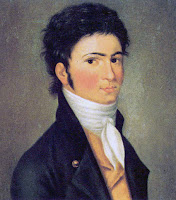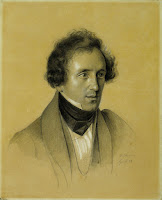 |
| Click on the image to hear Trio Céleste play Beethoven and Mendelssohn at Rolling Hills United Methodist Church. |
REVIEW
Trio Céleste, Second Sundays at Two, Rolling Hills United Methodist Church
DAVID J BROWN
This was the finale of Classical Crossroads’ “Second Sundays at Two” 2021-22 season of chamber music recitals, impacted of course by Covid (so still not open to unlimited audience attendance), but otherwise going out on a strong note with two compact masterpieces, one late Classical and the other early Romantic.
Rather as Beethoven’s Fourth Symphony has been overshadowed by its numerical neighbors—not to mention the mighty Ninth—so his Piano Trio No. 4, Op. 11 “Gassenhauer” (in the same key, B-flat major, as the Fourth Symphony) feels something of a lightweight within that genre of his chamber music, following as it does the imposing set of three that he proudly labeled his “Opus 1,” and succeeded by, amongst others, the famous “Ghost” Trio (No. 5 in D major, Op. 70, No. 2)—named for its (literally) haunting slow movement—and the unprecedentedly expansive “Archduke” (No. 7 in B-flat major, Op. 97).
But not to Trio Céleste (Kevin Kwan Loucks, piano, Iryna Krechkovsky, violin, and Ross Gasworth, cello), who have it firmly in their repertoire (one previous performance reviewed here) and perform it with a concentrated energy, crispness of ensemble, and close observation of sudden dynamic contrasts that are far removed from the easy-going Gemütlichkeit of some other performances.
 |
| Beethoven in 1801, seven years after he composed his Fourth Piano Trio. |
Following this, the Adagio was dignified but not lingering, and given as con espressione as the composer could require, while the finale—nine variations on the popular (in 1797) melody "Pria ch'io l'impegno" ("Before I go to work")—had all the whiplash changes of mood, pace, and dynamic that it needs, with a particular bounce added to the coda where Beethoven shifts from 4/4 to 6/8. What a wealth of wit and variety he packs into its six minutes!
The other work was Felix Mendelssohn's Piano Trio No. 1 in D minor, Op. 49, which as much as any other amongst his chamber music output counters any thoughts of him as a comfortably Biedermeier composer. Trio Céleste’s account of the first movement, if like the other three not quite up to Mendelssohn’s extremely fast metronome marks, was as wholeheartedly Molto allegro ed agitato as the succeeding slow movement—in the greatest imaginable contrast—fulfilled its Andante con moto tranquillo marking.
 |
| Mendelssohn in 1834, five years before the First Piano Trio. |
Next season, Classical Crossroads plans to return to free public live-audience concerts for both its “First Fridays at First!~fff” and “Second Sundays at Two” series, but with the innovation of simultaneous true livestreaming for those who cannot attend in person and with the resulting recording made available on Vimeo, potentially for a worldwide audience. All credit to them for having triumphed over Covid adversity while maintaining the highest artistic standards, and with the promise to come back stronger than ever—donations here!
---ooo---
Second Sundays at Two, Rolling Hills United Methodist Church, Rolling Hills Estates, Sunday, June 12, 2022, 2.00 p.m.
Images: The performance: Courtesy Classical Crossroads; Beethoven and Mendelssohn: Wikimedia Commons.
If you found this review to be useful, interesting, or informative, please feel free to Buy Me A Coffee!













No comments:
Post a Comment